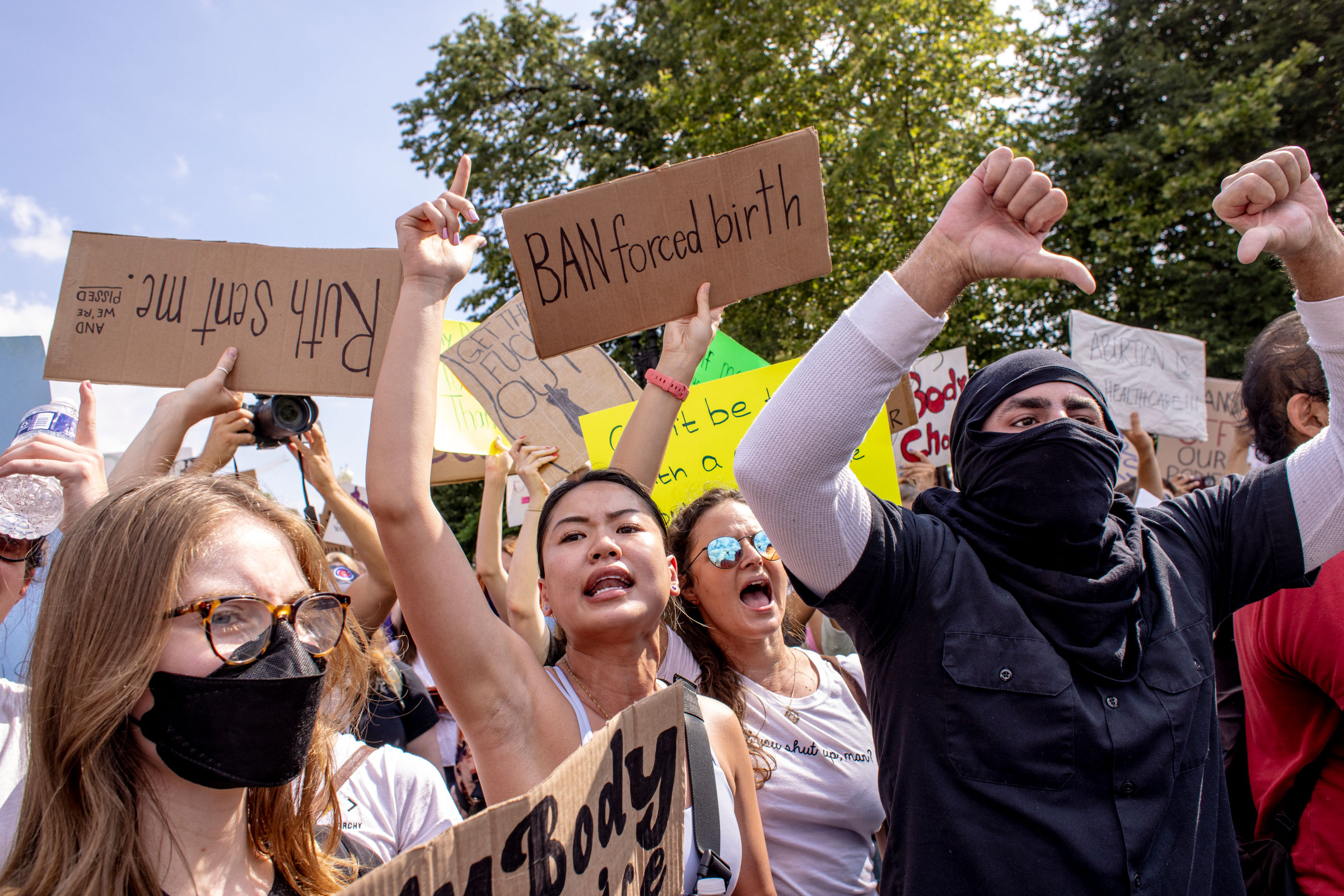The Supreme Court’s decision on Friday to overturn Roe v. Wade immediately thrust an explosive issue into the forefront of midterm races throughout the country, as Democrats said they would fight to restore federal abortion rights and many Republicans pressed for banning the procedure in their states and nationwide.
Though the high court’s 5-4 ruling to eliminate a constitutional right to abortion was not unexpected—Politico leaked a draft of the decision in May—it still came as a gut punch to Democrats, who quickly moved to energize their base and court independents to their campaigns ahead of the November elections. Recent polling shows roughly 66% percent of Americans support the abortion rights enshrined in Roe.
“We must elect more senators and representatives who will codify a women’s right to choose into federal law once again,” President Joe Biden said Friday at the White House. “This fall, Roe is on the ballot. Personal freedoms are on the ballot. The right to privacy, liberty, equality, they’re all on the ballot.”
Former Vice President Mike Pence, who is currently eyeing a 2024 presidential run, echoed other prominent Republicans in celebrating the Supreme Court ruling and vowing to work to advance abortion restrictions even further. “Having been given this second chance for life, we must not rest and must not relent until the sanctity of life is restored to the center of American law and in every state in the land,” he said in a statement.
In roughly half the country, the effects of overturning Roe will be immediately felt. Thirteen states have so-called trigger laws on the books that were designed to ban or restrict abortions in the event that the Supreme Court struck down Roe. Ten other states have laws banning abortions from before the landmark 1973 ruling that will now go back into effect.

While abortion is now expected to be a core issue for campaigns across the country, it will be particularly salient in a handful of races where the outcome could determine the future of abortion access in those states.
One of those races will be the gubernatorial election in Pennsylvania, where Attorney General Josh Shapiro, a Democrat, has promised to block any bill the GOP-controlled legislature passes to outlaw or restrict abortion rights. “Our Republican legislature will send a bill to our next Governor’s desk to ban abortions in Pennsylvania,” he tweeted Friday. “Without Roe, the only thing stopping them is the veto pen of our next Governor.”
Shapiro’s opponent, Republican State Senator Doug Mastriano, is promising voters the exact opposite. “Roe v. Wade is rightly relegated to the ash heap of history,” Mastriano said on Friday. “As the abortion debate returns to the states, Pennsylvania must be prepared to lead the nation in being a voice for the voiceless.”
Abortion is also likely to factor into many congressional races, though how widely and how strongly remains unclear. With a Democrat in the White House through at least 2024, Republicans would not be able to advance any measures further restricting abortion. But many Democratic voters are skeptical their party can effectively counteract the effect of Friday’s ruling if given the chance.
After a draft of the ruling leaked in May, many Democrats in Congress issued fiery statements about the need to codify Roe into federal law. But in the evenly divided Senate, where the Democratic caucus has 50 members but 60 votes are needed to bypass a filibuster, the effort went nowhere. Majority Leader Chuck Schumer, of New York, wanted to change the filibuster rules to codify Roe with a simple majority vote but the effort fell short when Sens. Joe Manchin of West Virginia and Kyrsten Sinema of Arizona, both moderate Democrats, refused to support the maneuver to overcome Republican opposition.
That dynamic isn’t likely to change anytime soon. It’s why Democratic candidates for the Senate are staking their claim on changing the filibuster rules to pass abortion protections, as well as other progressive priorities.
“I think the Senate needs to reform the filibuster and pass it,” Rep. Tim Ryan, Democrat of Ohio, tells TIME. “We passed it out of the House. It went to the Senate and died. We need to make sure that we can get it through the Senate. It’s imperative for us to get that done—and that would mean reforming the filibuster.”
Ryan is currently running for an open U.S. Senate seat in Ohio to replace outgoing Republican Sen. Rob Portman. It’s one of the few opportunities Democrats have in 2022 to turn a red seat blue. Standing in Ryan’s way, however, is J.D. Vance, the best-selling author of Hillbilly Elegy who went on to become a right-wing firebrand. (Vance secured the GOP nomination after getting Donald Trump’s endorsement.) According to the latest polling, Ryan and Vance are running neck and neck.
Abortion, Ryan says, will help to move the needle in his direction, especially as Mike DeWine, Ohio’s Republican governor, and a GOP-controlled state legislature are moving to ban the procedure, and Vance has been an outspoken opponent of abortion rights.
“Just look at his record,” Ryan says of Vance. “I don’t want to overly politicize today, but like he said, ‘Rape is inconvenient.’ He is for zero exceptions. Zero. If you feel that way in Ohio, you have a candidate you want to vote for. But they should at least know what they’re getting into. He’s the extreme of the extreme.”
Vance, for his part, extolled the Supreme Court’s evisceration of Roe on Friday. “Today is a great day,” he said in a statement. “We now enter a new phase of the pro-life movement.”
“Some of our efforts will be federal, and others local,” Vance added, “but all will be focused on the simple principle that life is worth protecting—from the moment it begins until its natural end.”
The high court’s decision on Friday quickly triggered a passionate reaction from voters. Within minutes after the ruling’s announcement, thousands of Americans gathered outside the high court in downtown Washington, most of them in support of abortion rights.
Pro-choice activists had a long list of grievances. They were furious at a conservative majority of justices who reversed a constitutional right to abortion after nearly 50 years; at a right-wing movement that had strategically mobilized for decades to manufacture such a decision; and at a Democratic Party that had been apparently powerless to stop it.

“Establishment Democrats are the reason for this,” an exasperated Nadine Seiler told TIME steps away from the marble courthouse, “because they are gutless and spineless, and they don’t want to push the issue.”
For Seiler, 57, the issue is deeply personal, and complicated. She was born in Trinidad to a mother who didn’t want her. Because abortion is illegal in most cases in the Caribbean nation, her mother was forced to carry out the unwanted pregnancy. “I was mistreated, neglected, and up to this day, it still affects me,” says Seiler, who now lives in Waldorf, Maryland. As we spoke, demonstrators in the background were screaming “Get your rosaries off my ovaries!”—referring to the fact that four of the five justices who voted to overturn Roe are Catholic.
Others outside the court rejoiced at what they saw as a long-fought victory for the sanctity of life.
Alexa Petre, 19, traveled to Washington, D.C., from Nashville, Tennessee, in anticipation of the controversial decision. “I chose to come here because I have three adopted siblings,” she told TIME. “They’re my everything and I can’t imagine if their birth mother had chosen something different.”
Meanwhile, in many states, Americans are starting to grapple with a new reality. In Wisconsin, clinics immediately canceled abortions scheduled for that day. “We are seeing immediate consequences,” Sarah Godlewski, Wisconsin’s state treasurer and a Democratic candidate for U.S. Senate, tells TIME. “This is not just a hypothetical. It’s a reality.” Wisconsin is one of the 10 states with a pre-existing law to prohibit abortions; the state never rescinded a 173-year-old statute that criminalizes the procedure.
Godlewski is running in the August primary to vie to unseat Republican Sen. Ron Johnson. She says abortion will be a centerpiece of her campaign. Voters are particularly receptive at this moment to candidates who are committed to safeguarding rights such as abortion, she says.
“Something that I am hearing a lot, especially since the leak, has been how frustrated people are that we haven’t codified this earlier,” says Godlewski. “We’ve had 50 years to get this done. I think we need more pro-choice Democratic women at that U.S. Senate table because they would have prioritized this a long time ago.”
More Must-Reads From TIME
- The 100 Most Influential People of 2024
- The Revolution of Yulia Navalnaya
- 6 Compliments That Land Every Time
- What's the Deal With the Bitcoin Halving?
- If You're Dating Right Now , You're Brave: Column
- The AI That Could Heal a Divided Internet
- Fallout Is a Brilliant Model for the Future of Video Game Adaptations
- Want Weekly Recs on What to Watch, Read, and More? Sign Up for Worth Your Time
Contact us at letters@time.com